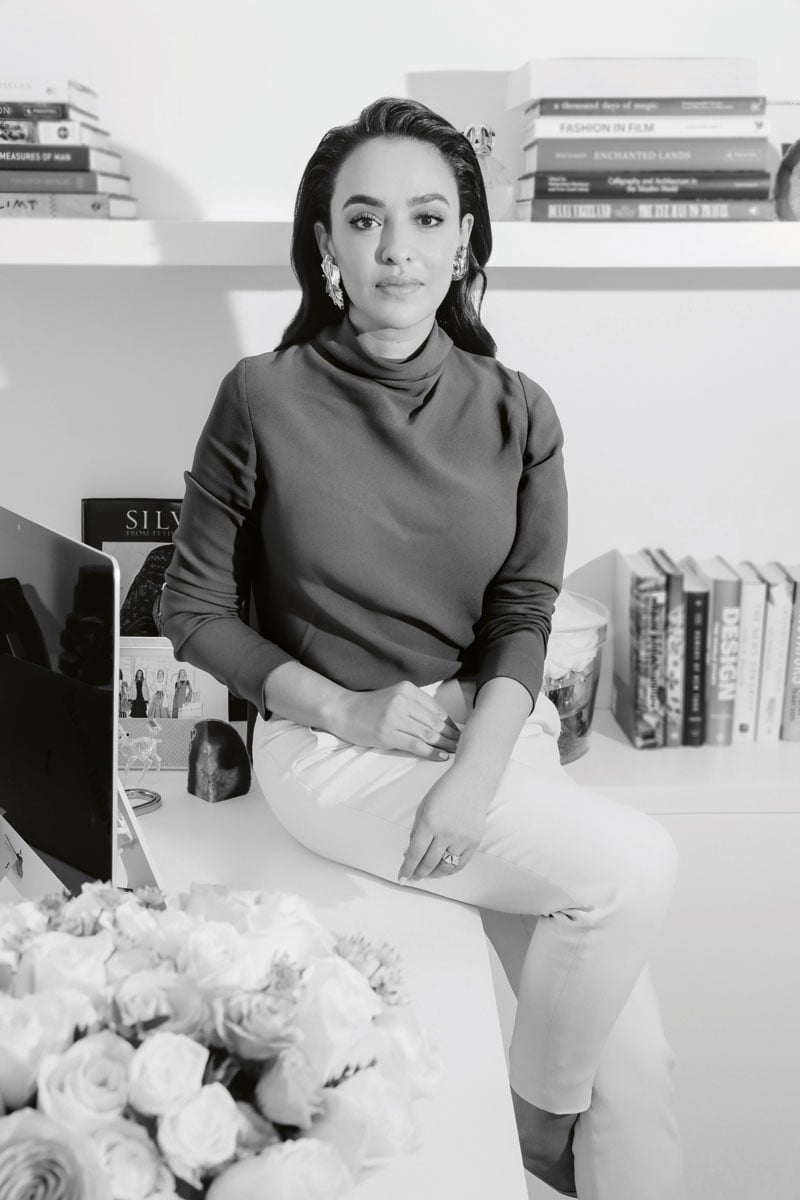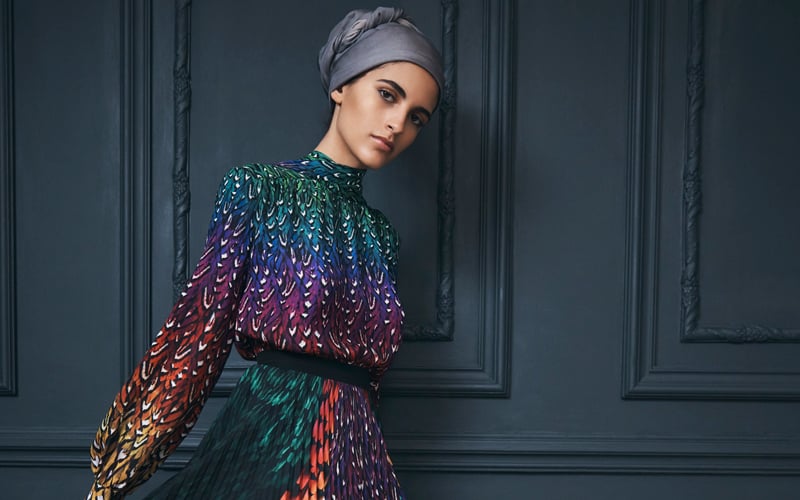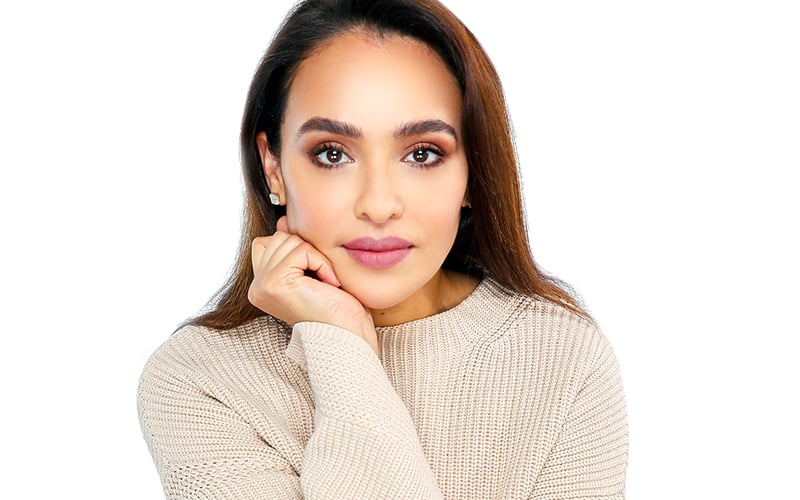October’s – ‘The Bravery Issue’ – Download Now
Ghizlan Guenez has grit. Not only for launching The Modist, but for having the courage to let go.
It takes great courage to launch a business; it takes even more courage to know when to close it. As the global pandemic proceeded to impact businesses around the world, Ghizlan Guenez, the founder of The Modist, made the difficult decision to cease operations. Guenez was born in Algeria and grew up between Beirut and Dubai. She studied at the London School of Economics before working for 10 years in private equity at The Abraaj Group. Her love for fashion comes from her mother, but she became frustrated with how long it took to find a modest outfit and knew that many women were having the same problem. She started developing the concept of a luxury platform that caters to a conservative customer and after almost two years of preparation, the website launched in March 2017.
Within three years, The Modist has not only been part of the modest fashion movement, it was the main driver. For those who have previously struggled to find pieces from luxury brands could finally shop from over 180 designers and discover innovative ways to layer and style those pieces. Farfetch invested, Guenez made the Business Of Fashion’s BoF500 list – the definitive professional index of the people shaping the fashion industry, was nominated in the Visionaries category and even launched an in-house label Layeur which has been worn and championed by the likes of Queen Rania of Jordan.
No successful entrepreneur starts a business without thinking it could fail, but Guenez does not see the closing of The Modist as a failure. In its short digital life, it has transformed the wardrobes of women around the world and enriched Guenez with newfound courage to take on the next challenge.

What have been your highlights from establishing and growing The Modist?
There have been many highlights in the journey but the ones that stand out the most and left an emotional impact have always had to do with the community that we harnessed as a business. Our launch garnered such incredible response from diverse women far and wide from America, Saudi Arabia, Australia and everywhere in between. We knew there was a need but we didn’t anticipate how much women wanted a platform like The Modist. Ironically, another highlight moment was when we announced our closure. The outpouring of love and incredible sentiments shared on social media platforms about The Modist was beyond anything we’d expected.
How do you feel The Modist changed the fashion landscape?
I believe that as a brand we succeeded in putting modesty with a fresh perspective on the fashion map. One of our values was to break stereotypes and celebrate our woman and we were able to show that through bringing a cool and fashion-forward spirit to a concept that had long been associated with religion or an old-fashion sense of style. We did that whilst always championing the idea of choice and that exercising your choice be it to cover, or not, is the most empowering thing.
At what point did you know you had to close the business?
As you can imagine, we had tried to find a solution to continue to operate and save the business. There was a lot of potential still and a clear opportunity, but the odds were against us and the circumstances were very challenging. In March when COVID-19 escalated we had to do the responsible thing and pull the plug.
How did you stay strong at this time?
This was probably one of the hardest things to deal with emotionally. It’s very demanding on a founder because you have to be strong for your team, your colleagues, your community and then deal with your emotions on your own. It was especially difficult because The Modist was not a failure as a business, it was growing and had a glaring opportunity and potential, but at the end of the day, once you have honoured your emotions you must act rationally and understand that this is part and parcel of founding a business. Things may or may not work out and one has to take the good with the bad and continue moving. 
What was the most challenging part of the transition?
My most difficult moment through the entire process was sharing the news with my team. It was a very heavy moment.
What lessons have you gained through this experience?
So many lessons were learned. It’s ironic but I feel far richer as a person after this experience. The learnings, the emotional and mental growth that you go through and the resilience that you build are invaluable. I learned that failure is part of the success and that we must manage its stigma and not be fearful of it. I also learned that whilst it takes a lot of courage and strength to be vulnerable, it is incredible how freeing it is to be honest and share your story openly. You move from trying to manage your ego to enjoying the strength that vulnerability gives you.
Would you agree that to be an entrepreneur is to be brave enough to risk failure?
Absolutely! I’m a firm believer that you only reach success in life when you’ve gone through numerous failures. The key is to learn and not repeat the same mistakes. We are so obsessed with success that we don’t normally see or talk about what it took to get there. I read a book that left a big impression on me early on in my journey as a founder called “The Hard Thing About Hard Things” by Ben Horowitz, ones of the most successful venture capitalists in the world, where he talks about all his failures before founding one of the best VCs in the world. Nobody gets to the top without experiencing failure.
Has your experience given you the courage to pursue another venture?
Without a doubt. I’m a very positive person and very driven and whilst this has been a very big learning experience I’m not disheartened as an entrepreneur. I love building a business, solving a problem, offering an incredible product, adding value and building a community. It’s my passion and what drives me.
View this post on Instagram
What self-care do you invest in during challenging times to ensure you remain strong?
That’s been one of the upsides of quarantine for me personally. I had the time to sit with my thoughts, reflect and also take the time focus on my health, which had been impacted due to the mental and emotional stress. What people don’t know is that closing a business is almost harder than launching it as there is a lot of work involved and it is very draining by what it entails. Having said that, it’s been manageable and I’ve been quite disciplined about prioritizing looking after my physical, mental and emotional wellbeing. It’s one of the learnings that I’ve taken out of running a very demanding business for four years.
Who makes you strong?
My family and very close loved ones are pillars of strength for me and I believe that’s so important when you’re going through adversity in life in general. I also believe so strongly in have one or more mentors that you trust and who have the right experience and knowledge to support you. I have however been fortunate overall to have received an incredible amount of love and support from the large community that The Modist built. It was so clear that all the passion and effort that we had put into it since we launched created a true authentic emotional bond between the brand and the community.
What are your most treasured memories from building The Modist?
There are so many that I treasure still today. Despite being a very young business we’d experienced many successes. We were chosen twice by Fast Company as one of the most innovative companies in the world, I was selected as one of the BOF500, we had incredible women wear our own brand Layeur such as Queen Rania on very special occasions. The highlights, however, have always been messages from women in our community expressing how much of an impact The Modist had on them and how they finally feel like they’re represented in the right light and an authentic way.
Which other businesswomen, designers and brands do you turn to for inspiration?
Sara Blakely is one whose journey truly inspires me. I’m also inspired by young entrepreneurs like Katrina Lake of Stitch Fix, Huda and Mona Kattan of Huda Beauty, Jen Rubio and Steph Korey the founders of Away.
View this post on Instagram
How do you spend your personal time?
I love working out and being active, reading, travelling and I’ve recently started learning to play the piano. I’m very passionate about growth in general and continuously evolving as a person at all levels so anything that fuels that is ideal.
What advise would you give to other entrepreneurs in a similar situation?
I would encourage them to try everything possible to keep their businesses alive, downsizing, pivoting, trying out other models and ways to generate revenue, staying closely in touch with their customers and so on, but if you clearly see that continuing to run the business may only create more complex issues and that you have reached a dead-end then pull the plug. You may be able to resurrect it down the line or start afresh. The truth is that when you start a business you have to accept that there is a chance to succeed and a chance to fail, but ultimately adopt a positive mind-set and do all you can to make it a success.
Which motivational books or podcasts do you recommend?
I post some of those on my Instagram account as and when I come across them. I like a few podcasts like “How I Built This” and “The School Of Greatness”. I also like books such as “Grit” and “Shoe Dog” as well as the one I shared earlier “The Hard Thing About Hard Things”.
What are your top three pieces of advice for running a successful business?
One, be very clear on the opportunity and having the right product for the customer to meet the demand. Two, have the right team to deliver your vision and give them autonomy and accountability. And three, create a culture of learning and winning where the team feels comfortable owning their mistakes and sharing their learnings.
What is key to being a good leader?
I’m not sure if there is one that I can single out but I believe always being in control of your emotions and being rational. A dose of emotion as a leader is very good and important, but when times are tough staying in control, composed and keeping a positive mindset is crucial.
What is bravery to you?
Owning both your successes and failures and being strong enough to vulnerably share both.
October’s – ‘The Bravery Issue’ – Download Now
– For more on luxury lifestyle, news, fashion and beauty follow Emirates Woman on Facebook and Instagram
Images: Supplied, Instagram










